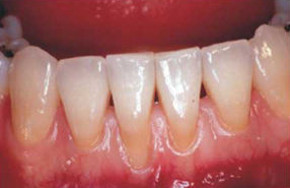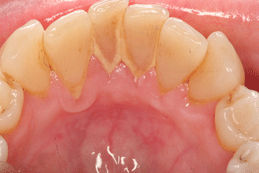What are receding gums? Receding gums, also known as gingival recession in dental circles, is the process in which the gum line pulls back, or away from the tooth. We’re Doctors Gover and Gover, Raleigh Dentists who have helped many patients over the years with receding gums.
Receding gums expose much more of your tooth than should be exposed otherwise, and if allowed to progress will eventually lead to tooth loss. As more and more of the teeth are exposed, it can have an obvious negative effect on your smile as well.
What Causes Receding Gums?
- Periodontal Disease Gum recession has numerous causes, most common of which is gum disease, also known as periodontal disease. Receding gums are essentially the first sign of gum disease. This process of gum degeneration around the teeth can lead to serious oral health issues. Gum disease occurs when bacteria in the mouth, along with foreign matter such as food particles, begin to form plaque. If not removed, this plaque begins to harden forming tartar or calculus. As it does so, it irritates and inflames the gums surrounding the teeth. Once the tartar is formed, it creates a haven for bacteria to grow. Basically the tartar buildup forms a type of wedge between teeth and the healthy gums. This creates pockets for the bacteria to eat away at healthy tissue. The acids, bacterial waste and toxins eventually erode the healthy gum tissue away. The appearance of receding gums is the result.
- Crowded Teeth due to abnormal tooth positions
- Genetics and Hereditary Issues that produce thin or insufficient gum tissue. These individuals are just naturally predisposed to more trouble with gum recession but with proper dental care can keep it at bay. They just may have to be a little more vigilant than average.
- Aggressive tooth brushing. Using a softer brush and proper technique should help.
- Poor or irregular dental care. It is important to brush and floss regularly and go for 6-month dental visits for cleaning and exams that are simply more thorough than what you can do on your own. When you’ve gone a while between dental visits, if you don’t floss, or if you just have overall less-than-perfect dental hygiene habits like most people; plaque will begin to build up on and in-between your teeth. After a while, this plaque turns into the hard tartar which only a dentist can remove. If this tartar is left on your teeth long enough, receding gums and the early onset of gum disease will be the result.
- Tobacco use
- Eating disorders
- Hormonal changes
- Bruxism, or grinding the teeth
Risks associated with receding gums
An initial diagnosis of receding gums is a sure sign of more serious problems ahead for your gums if left untreated. Assuming the gum recession is due to plaque and tartar buildup, the issue with oral health is actually that the bone below the tooth will actually recede as well due to the toxins and acids given off by the bacteria. Basically the recession of the gums is slowly following the recession of the underlying bone. What likely started as a manageable problem with plaque buildup and mild gingivitis advances to full on periodontitis as the roots of the tooth are exposed and the teeth become loose and painful. Tooth extraction and dentures are the final cure at this advanced stage.
But an even bigger concern however is that receding gums can be a warning sign for other health issues that can be quite serious – and furthermore most people would never link these health issues to oral health and gum disease.
Perhaps more serious than the health of the teeth and gums is actually the risk of heart disease and stroke. A recent study found that gum disease was associated with a 19% increase in the risk of heart and cardiovascular disease. It is believed that bacteria, which are en mass when gum disease is present (a primary cause of receding gums), enters the blood stream and travels throughout the body and heart. This can promote coronary artery disease and the plaque build-up in the arteries.
What to do about receding gums
If it appears your gums are losing ground and more of your teeth are being exposed, then you should make a dental appointment as soon as possible! If you have the risk factors listed above that you can control, you should take steps to do so immediately. This is no time for procrastination, because gum recession is not reversible. But you can stop the problem rather quickly and permanently with the right short-term and long-term dental care. So if you do think you have receding gums, the sooner that the excess plaque and tarter can be cleaned and kept off, the better!
If you suspect you have receding gums, definitely contact our dentists about your condition and make an immediate appointment for an exam and cleaning.


